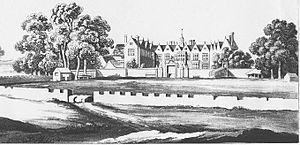Grey Neville facts for kids
Grey Neville (born September 23, 1681 – died April 24, 1723) was an important English landowner and politician. He lived at Billingbear in Berkshire, England. He served as a Member of Parliament (MP) in the English House of Commons from 1705 to 1708. After that, he was an MP in the British House of Commons until 1723.
Early Life and Education
Grey Neville was born in London on September 23, 1681. His parents were Richard Neville and Katherine Grey. His family lived at Billingbear House in Berkshire. Grey also had a brother named Henry Neville.
Grey Neville was taught at home when he was young. In 1699, he joined Middle Temple, which is a place where people study to become lawyers. From 1699 to 1700, he traveled across Europe. He visited countries like the Netherlands, Germany, Switzerland, Italy, and France. During his travels, he wrote in a diary and thought deeply about religion.
When he returned home, Grey Neville became very interested in religious groups. He supported the SPCK (Society for Promoting Christian Knowledge) and the SPG (Society for the Propagation of the Gospel). These groups worked to spread Christian teachings and help people. He even attended their meetings often, which earned him the nickname 'Bishop Neville'.
After a few years, he decided to leave the main church and joined a different religious group led by Thomas Bradbury. On February 14, 1706, Grey Neville married Elizabeth Boteler.
Political Career
Grey Neville started his political career in 1705. He was elected as a Member of Parliament (MP) for Abingdon. An MP is a person elected to represent people in the country's parliament. His opponent, Sir Simon Harcourt, tried to challenge the election results, but he was not successful.
In the 1708 election, Grey Neville was elected again, this time for Wallingford. He won without anyone running against him. However, he lost in the elections of 1710 and 1713. He also lost an election in Berwick-upon-Tweed in 1713.
In the 1715 election, Grey Neville was elected for Berwick-upon-Tweed again. He won without opposition, alongside another politician named John Barrington. In 1715, he was given a job as a Commissioner. This meant he helped check the money owed to the army. He held this job until 1721. In 1717, his father passed away, and Grey Neville inherited the family home at Billingbear. He was re-elected for Berwick in the 1722 election.
In Parliament, Grey Neville was a loyal member of the Whig party. The Whigs were one of the main political groups at the time. He supported a law in 1708 that allowed foreign Protestants to become British citizens. He also voted to remove Henry Sacheverell from his position, which was a big political event. Grey Neville usually voted with the Whig party.
When the Whig party split into different groups, he joined the group led by Robert Walpole. He voted with the majority to reject the Peerage Bill in 1719. One of his most notable actions in Parliament was in 1721. He defended James Craggs the elder and John Aislabie, who were involved in issues with the South Sea Company.
Grey Neville passed away on April 24, 1723. He had one daughter, but she did not have any children.
 | Anna J. Cooper |
 | Mary McLeod Bethune |
 | Lillie Mae Bradford |


